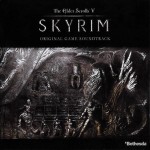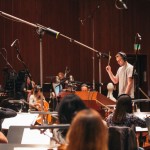Well, Deep Silver had been busily working away on two games that we were interested in this year. The first was Cursed Mountain, which featured some amazing horror music, and the second was Risen, which was just released this week. I honestly had no idea what to expect from composer Kai Rosenkranz, but upon hearing some of the music in the game, I can tell you it sports equally awesome dark ambiance with some intense actions themes thrown in the mix. The European version apparently came with the game’s soundtrack, but I don’t know at this point if it’s in the US release.
Gideon had the pleasure of meeting Kai Rosenkranz at a recent Deep Silver press event, and told me he is a pretty cool dude, but we were fortunately able to sit down with him and have a formal discussion about the game’s score. We get a little background info about Rosenkranz and his work at Piranha Bytes and also learn about his approach to the game’s score and some of his inspirations.
The soundtrack has some seriously good stuff to offer, so check out our interview with Kai Rosenkranz after the jump.
OSV: Hello Kai. Thanks for taking the time to talk to us about your work on Risen. Please start by telling us a bit about yourself. What is your role in the development of Risen at Piranha Bytes?
Rosenkranz: My name is Kai Rosenkranz, and I’m in charge of the audio sector. My job as Piranha Bytes’ audio director is to define the overall acoustic style of the game. Since I also happen to be the composer and sound designer, I’m responsible for the actual realization as well.
OSV: So you’ve worked on all the previous titles from Piranha Bytes, including the Gothic series. How did you work on Risen compare to your previous works?
Rosenkranz: The audio sector was subject to constant evolution. Since Gothic 1, my approach to creating the music went through various stages. What they all have in common is that I want to set the emotional tone through the soundtrack. I consider the music to be a voice actor, rather than just an acoustic backdrop. My job is to either underline a mood that already comes across very well in the visuals, or add something that hasn’t been there before at all.
When it comes to the realization of this goal, I often find myself just playing the keyboard and recording my ideas. I “speak” the piano fluently as my emotional language; I close my eyes and just let serenity, menace, tension, relief, peace or disorder flow out of my hands onto the keyboard, while the PC records the brainstorming for later examination. The next step is to find an appropriate instrumentation and create the arrangement. I use the sequencer software Cubase by Steinberg for this part of the job. Afterwards, the material will either be performed by a virtual orchestra, or by a live orchestra as in Gothic 3. For Risen, I blend virtual soundscapes with real instruments, which helps me to create a huge amount of music which still sounds authentic and suits the overall atmosphere.
OSV: The game takes place on an island, so how did this isolation factor into the music you created for the game? It sounds like there’s a large amount of atmosphere in the game.
Rosenkranz: What’s remarkable about the island is the fact that a volcano towers above everything, adding an element of constant threat. I pick this up in the music, weaving some tension even into the most idyllic themes. Generally, instead of using lofty orchestral arrangements, I went for a more minimalistic approach. Solo instruments such as the acoustic guitar, various flutes and a solo trumpet play an important role, as they express the solitude of the nameless hero (in most parts of the game) and follow him on his emotional journey.
OSV: Does the game feature an interactive score, or is it more static?
Rosenkranz: The game player experiences a large variety of different situations, from exploration and adventure to fast-paced battles. The music has to be able to do the same thing, with seamless transitions between each of the tracks. With the adaptive music system in Risen, I can react to the players’ actions and decisions without any quality losses. Even when the player enters an unforeseen fight, the music changes quickly, but without any distracting audible transitions.
OSV: We’ve been told that you’re also responsible for the sound effects in Risen. Did you create your own sound effects, or did you rely mostly on sample libraries?
Rosenkranz: In most cases I use sounds from different animals and mix them together. An ashbeast, for instance, is a mixture of gorilla, lion, bear and walrus, with a little hint of buffalo. Of course, the sounds have to be altered and edited in order to match. However, for some species I had to record my own material. Various layers of human grunting and snarling have made it into the creature sounds for Risen. Some humanoid species have been given their own “voices” in the recording studio.
OSV: Tell us about some of your musical inspirations and how you start your research when you’re developing a new theme?
Rosenkranz: Usually, I start defining the musical tone in a very early stage of development when there’s nothing but concept art and story documents. The concept art helps a lot, as it serves the exact same purpose as the music: expressing the mood and emotion of a certain location. So I can work with that very well, even if the location in question hasn’t been implemented at that point.
OSV: Risen features a variety of different cultures and races. How did you go about creating unique themes for each group?
Rosenkranz: When you get to their headquarters, the music is designed to express both the mood of the scenery and the inhabitants’ personality. The bandits, for example, are very relaxed and laid-back. So even if their camp is situated in the middle of a dangerous swamp region, the music makes it feel like your cozy home-base. The leader of the bandits, a character called “the Don,” is a charismatic blend of pirate and Robin Hood, and his attitude comes across, too.
The base of the Order of the Inquisition is a strange place. The Inquisitor makes his people prepare for battle, so this place feels like barracks rather than the monastery it used to be. The music contains both sacral and military elements to underline the ambiguity.
OSV: What kind of music are you listening to when you’re not re-listening to your work for your projects?
Rosenkranz: I love soundtracks, but outside the field of soundtracks I like this kind of music: www.martiniinthemorning.com.
OSV: Can you tell us about some of the composers out there who are your favorite or have influenced you the most?
Rosenkranz: Right now, my favorite composer is James Newton Howard, with Harry Gregson-Williams as a close runner-up.
OSV: Thanks for your time. We’re looking forward to hearing your music in Risen.
Tags: Ambient, Deep Silver, Fantasy, Interviews, Kai Rosenkranz, PC, Risen, Videogame









































I haven’t listened to the Risen soundtrack yet. But I love Kai’s work on Gothic 3. Pretty good stuff.
Not as good as The Witcher soundtrack but still very solid. The guitar parts are truly beautiful.